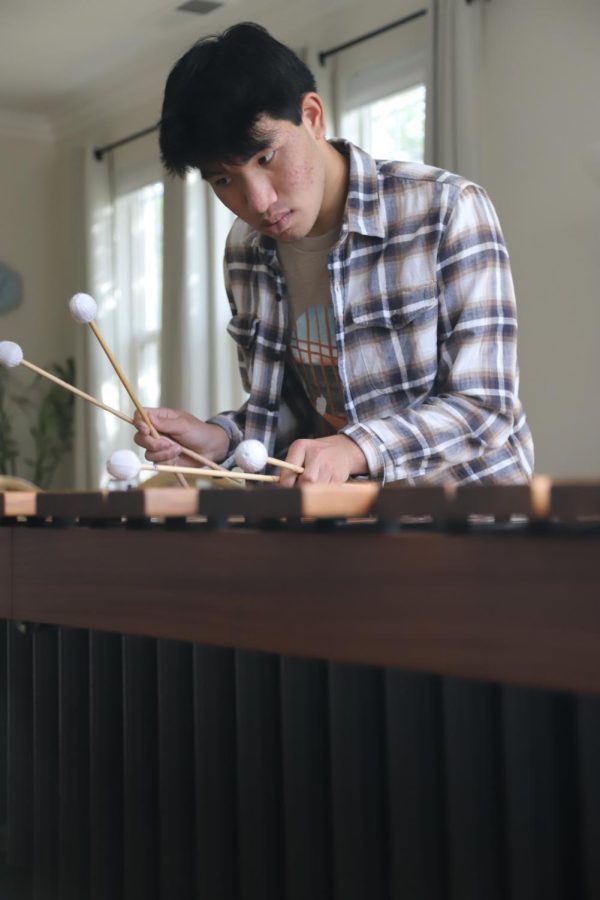Humans of Harker: Strike a chord
Harrison Chang develops his own playstyle
“A lot of people think that in general, percussion is very basic, like hitting instruments, but with the marimba, you can do so much more. There are different types of mallets, different types of bars and different types of sounds you can make, so the versatility of percussion makes the potential to create infinite. It’s really cool how you can integrate a lot of skills and make your own style of music,” Harrison Chang (12) said.
After lunch, hands pound an orange ball ribbed with black stripes against the wood flooring of the Auxiliary Gym, dodging through small skids of spilled guacamole before swishing it through the hoop net. Ninety minutes later, those same hands gently tug a marimba from the shadows of Patil Theater and into the limelight, guiding the pairs of mallets that dance across wood tone bars. Basketballs and marimba mallets: both play an important role in the life of Harrison Chang (12), an avid artist and performer.
The journey of the marimba into Harrison’s home began before he was born. His mother fell in love with the instrument after immigrating to the United States from Taiwan, and later decided to pass on her appreciation of the marimba to her children, Harrison and Katie Chang (‘20). Now, Harrison has held marimba mallets for around 11 years. He loves the activity for its innovative feel — a space where music becomes whatever is made of it, through experimentation, learning and growth.
“A lot of people think that in general, percussion is very basic, like hitting instruments, but with the marimba, you can do so much more,” Harrison said. “There are different types of mallets, different types of bars and different types of sounds you can make, so the versatility of percussion makes the potential to create infinite. It’s really cool how you can integrate a lot of skills and make your own style of music.”
While Harrison’s dedication to marimba led him to percussion ensemble groups and private studies, such as those under Ludwig Albert and Marimba One artist Tammy Chen, developing a distinctive identity in music proved to be harder. Harrison committed himself to overcoming the struggle of finding his own playing style, an accomplishment he achieved in his freshman year.
“It was really hard to find what my style was,” Harrison said. “I went on a study abroad trip to Portugal and studied with a professor who showed me how to find my style. That’s my most meaningful experience I’ve had. That’s how I overcame my challenge.”
The practice, persistence and dedication that Harrison gives to his music extends to his interactions with the friends and communities he enjoys spending time with. Close friend Melody Luo (12), who braved the wilderness of sophomore chemistry with Harrison as her desk partner, admires how supportive a friend he is.
“Even when [Harrison] meets challenges or adversity, he always remains super calm and collected, and he always manages to put any situation in this really humorous light,” Melody said. “The fact that he’s able to balance all of these activities and still remain just as upbeat and optimistic is something that is really emotionally mature and nice to see.”
This mindset helped to bring Harrison far, especially during marimba competitions. Eventually, he earned winner’s concerts at Carnegie Hall in New York.
“Performing at Carnegie Hall for the first time is something I am definitely proud of,” Harrison said. “What might be on par with that is beating my sister in a competition, because she’s someone I’ve always looked up to. Beating my role model meant a lot to me.”
Individual exploratory moments with percussion and a family that loves the instrument as much as Harrison does makes the marimba especially close to his heart. In addition to delighting in the freedom of creation in music, Harrison also enjoys observing the styles of others as they come into their own during competitions.
“Early on, especially in competitions, it was hard to differentiate [myself] as a musician because when you compete, each person has their own playstyle,” Harrison said. “That’s what makes them unique. That’s why I like competitions. They’re all so subjective because each judge has their own flavor that they like.”
In his interactions with others too, Harrison remains steady and optimistic. Friend of seven years Alex Zhang (12) appreciates how open Harrison remains in their friendship, striking a balance between laid-back optimism and persistence.
“[Harrison is] always easy to talk to,” Alex said. “You know you won’t be judged by him, and he’d always make the conversation engaging and memorable. He definitely earns everything he achieves, and he’s still fun to be around and play basketball with. I can tell that he works super hard for all of his grades and everything he does.”
Chemistry teacher Robbie Korin, who taught Harrison when he was a sophomore and still stops by Harrison’s current chemistry class for friendly banter, also notices how Harrison’s light-hearted, drawing others toward him through his storytelling, jokes and attentive listening that Harrison’s friends admire.
“It’s hard to get to know a personality sometimes, but [Harrison’s] shines through,” Korin said. “He was certainly one who I remembered quite quickly. He would be a person who I, in five to 10 years, would be interested to see what he’s up to. Any advice to Harrison would be to stay who [he is].”

Katie Wang (12) is the photo editor of the TALON Yearbook, and this is her fourth year on staff. This year, Katie looks forward to photographing with new...

Sally Zhu (12) is the co-editor-in-chief of Harker Aquila, and this is her fourth year on staff. This year, Sally wishes to interview more people around...


















![“[Building nerf blasters] became this outlet of creativity for me that hasn't been matched by anything else. The process [of] making a build complete to your desire is such a painstakingly difficult process, but I've had to learn from [the skills needed from] soldering to proper painting. There's so many different options for everything, if you think about it, it exists. The best part is [that] if it doesn't exist, you can build it yourself," Ishaan Parate said.](https://harkeraquila.com/wp-content/uploads/2022/08/DSC_8149-900x604.jpg)




![“When I came into high school, I was ready to be a follower. But DECA was a game changer for me. It helped me overcome my fear of public speaking, and it's played such a major role in who I've become today. To be able to successfully lead a chapter of 150 students, an officer team and be one of the upperclassmen I once really admired is something I'm [really] proud of,” Anvitha Tummala ('21) said.](https://harkeraquila.com/wp-content/uploads/2021/07/Screen-Shot-2021-07-25-at-9.50.05-AM-900x594.png)







![“I think getting up in the morning and having a sense of purpose [is exciting]. I think without a certain amount of drive, life is kind of obsolete and mundane, and I think having that every single day is what makes each day unique and kind of makes life exciting,” Neymika Jain (12) said.](https://harkeraquila.com/wp-content/uploads/2017/06/Screen-Shot-2017-06-03-at-4.54.16-PM.png)








![“My slogan is ‘slow feet, don’t eat, and I’m hungry.’ You need to run fast to get where you are–you aren't going to get those championships if you aren't fast,” Angel Cervantes (12) said. “I want to do well in school on my tests and in track and win championships for my team. I live by that, [and] I can do that anywhere: in the classroom or on the field.”](https://harkeraquila.com/wp-content/uploads/2018/06/DSC5146-900x601.jpg)
![“[Volleyball has] taught me how to fall correctly, and another thing it taught is that you don’t have to be the best at something to be good at it. If you just hit the ball in a smart way, then it still scores points and you’re good at it. You could be a background player and still make a much bigger impact on the team than you would think,” Anya Gert (’20) said.](https://harkeraquila.com/wp-content/uploads/2020/06/AnnaGert_JinTuan_HoHPhotoEdited-600x900.jpeg)

![“I'm not nearly there yet, but [my confidence has] definitely been getting better since I was pretty shy and timid coming into Harker my freshman year. I know that there's a lot of people that are really confident in what they do, and I really admire them. Everyone's so driven and that has really pushed me to kind of try to find my own place in high school and be more confident,” Alyssa Huang (’20) said.](https://harkeraquila.com/wp-content/uploads/2020/06/AlyssaHuang_EmilyChen_HoHPhoto-900x749.jpeg)



